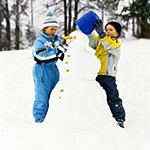When Play Dates Go Bad
 The headline for this column sounds like a dreadful (or possibly entertaining) reality television show. Unfortunately, it is something that every parent has experienced. In fact, many may say that you have not earned your parenting stripes until you have suffered the pain of a problematic play date.
The headline for this column sounds like a dreadful (or possibly entertaining) reality television show. Unfortunately, it is something that every parent has experienced. In fact, many may say that you have not earned your parenting stripes until you have suffered the pain of a problematic play date.
In the days of my youth, I remember a classmate would phone, our parents quickly worked out the details, and I was dropped-off shortly thereafter. Today, however, many parents frequently find that they must navigate a complex social situation that consists of courting not only an unknown child, but also his mom or dad. In fact, just securing a social activity for your young offspring can cause significant parental stress.
Most outings truly do go well, but your initial interaction with the prospective pal’s parent may be an indication of what to expect. Some moms may view you as a babysitter, while others believe an invitation for their child also is an invite for them. And there are those who will disregard drop-off/pick-up times, or call at the last minute to see if junior can come over to play. Be politely firm with your expectations and ponder if future playdates with these families are worth the trouble.
A parent should avoid choosing friends; rather, mom should consult with her maturing child, asking whom he would like to have to the house. Request multiple names and mix up the initial invites, promoting a variety of playmates versus a particular pairing. Exposing your child to multiple personalities will require that your son uses different social skills as well as provide the opportunity to develop multiple friendships.
Finally, plans are set and the big day is here, and parents need to set the stage for a fun afternoon. Start by ‘cleaning’ the house and packing away special toys that your son or daughter—no matter what their age—may not want a friend to use. It is much easier to hide the new Lego Star Wars set, than it is to tell a guest that a particular toy is off-limits. Also, remove any valuables and/or breakables that may worry you. The best way to avoid an incident is to take proactive steps of prevention.
A child needs guidance on how to be a good host. Discuss sharing and etiquette so that conflict over turn-taking can be avoided. Parents also should teach that planning is an essential part of successful socializing. A combination of specific activities, along with some unstructured time, will help kids balance their desire to play video games with your hope that they engage in some old-school, outside fun.
It can be difficult to avoid hovering during those initial gatherings, but a parental presence can create a situation where the kids are interacting with you instead of each other. If you do overhear a disagreement, mediate by guiding to resolution rather than fixing the problem. In the rare instance that either child truly oversteps the boundaries of acceptable behavior, it is OK to end the playdate, explaining to the other parent what has occurred.
Lastly, process the playdate with your child. Did he enjoy it, was his friend easy to engage, or did his guest do something that made him feel uncomfortable? The goal of the conversation is to listen to your child’s concerns, provide strategies for social problem-solving, and discuss how to be good a friend. Plus, there is the added benefit of promoting an open dialogue for any future concerns.
For better or worse, being a modern-day parent means you must initiate activities if you want your child to have any type of social life. The days of neighborhood kids freely roaming the streets have been replaced by supervised gatherings. Yes, bad play dates do happen even to good kids. Fortunately, once a child understands the art of entertaining, not only do kids have fun; but, more important, parents get a break.

